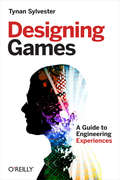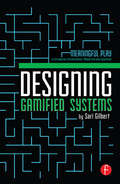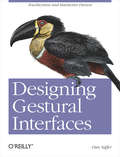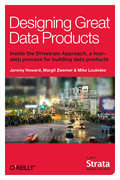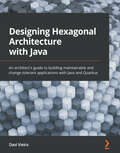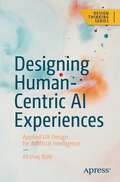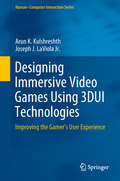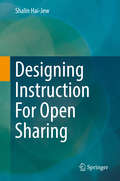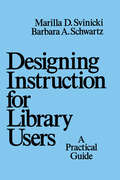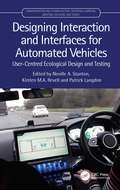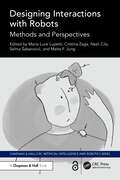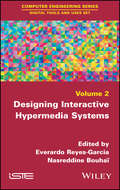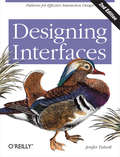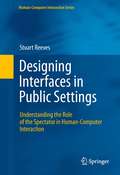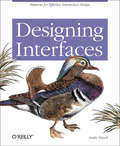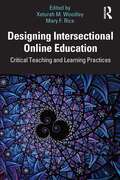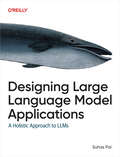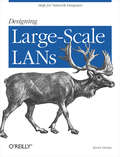- Table View
- List View
Designing Games: A Guide to Engineering Experiences
by Tynan SylvesterReady to give your design skills a real boost? This eye-opening book helps you explore the design structure behind most of todayâ??s hit video games. Youâ??ll learn principles and practices for crafting games that generate emotionally charged experiencesâ??a combination of elegant game mechanics, compelling fiction, and pace that fully immerses players.In clear and approachable prose, design pro Tynan Sylvester also looks at the day-to-day process necessary to keep your project on track, including how to work with a team, and how to avoid creative dead ends. Packed with examples, this book will change your perception of game design.Create game mechanics to trigger a range of emotions and provide a variety of playExplore several options for combining narrative with interactivityBuild interactions that let multiplayer gamers get into each otherâ??s headsMotivate players through rewards that align with the rest of the gameEstablish a metaphor vocabulary to help players learn which design aspects are game mechanicsPlan, test, and analyze your design through iteration rather than deciding everything up frontLearn how your gameâ??s market positioning will affect your design
Designing Gamified Systems: Meaningful Play in Interactive Entertainment, Marketing and Education
by Sari GilbertDesigning Gamified Systems is a fundamental guide for building essential skills in game and interaction design to revitalize and reimagine real world systems – from cities and corporations to schools and the military. Author Sari Gilbert develops a set of core principles and tools for using game thinking and interactive design to build motivation, explain hard concepts, broaden audiences, deepen commitments and enhance human relationships. Designing Gamified Systems includes: Topics such as gamified system design, behavioral psychology, marketing, business strategy, learning theory and instructional design Interviews with leaders and practitioners in this emerging field who explain how the job of the game designer is being redefined Exercises designed to both encourage big-picture thinking about gamified systems and help you experience and understand the challenges and nuances involved in designing them A companion website (www.gamifiedsystems.com) with additional materials to supplement learning and practice
Designing Gestural Interfaces: Touchscreens and Interactive Devices
by Dan SafferIf you want to get ahead in this new era of interaction design, this is the reference you need. Nintendo's Wii and Apple's iPhone and iPod Touch have made gestural interfaces popular, but until now there's been no complete source of information about the technology. Designing Gestural Interfaces provides you with essential information about kinesiology, sensors, ergonomics, physical computing, touchscreen technology, and new interface patterns -- all you need to know to augment your existing skills in "traditional" web design, software, or product development. Packed with informative illustrations and photos, this book helps you:Get an overview of technologies surrounding touchscreens and interactive environmentsLearn the process of designing gestural interfaces, from documentation to prototyping to communicating to the audience what the product doesExamine current patterns and trends in touchscreen and gestural designLearn about the techniques used by practicing designers and developers todaySee how other designers have solved interface challenges in the pastLook at future trends in this rapidly evolving fieldOnly six years ago, the gestural interfaces introduced in the film Minority Report were science fiction. Now, because of technological, social, and market forces, we see similar interfaces deployed everywhere. Designing Gestural Interfaces will help you enter this new world of possibilities.
Designing Great Data Products
by Mike Loukides Jeremy Howard Margit ZwemerIn the past few years, we’ve seen many data products based on predictive modeling. These products range from weather forecasting to recommendation engines like Amazon's. Prediction technology can be interesting and mathematically elegant, but we need to take the next step: going from recommendations to products that can produce optimal strategies for meeting concrete business objectives.We already know how to build these products: they've been in use for the past decade or so, but they're not as common as they should be. This report shows how to take the next step: to go from simple predictions and recommendations to a new generation of data products with the potential to revolutionize entire industries.
Designing Green Networks and Network Operations: Saving Run-the-Engine Costs
by Daniel MinoliIn recent years, socio-political trends toward environmental responsibility and the pressing need to reduce Run-the-Engine (RTE) costs have resulted in the concept of Green IT. Although a significant amount of energy is used to operate routing, switching, and transmission equipment, comparatively less attention has been paid to Green Networking. A
Designing Hexagonal Architecture with Java: An architect's guide to building maintainable and change-tolerant applications with Java and Quarkus
by Davi VieiraA practical guide for software architects and Java developers to build cloud-native hexagonal applications using Java and Quarkus to create systems that are easier to refactor, scale, and maintainKey FeaturesLearn techniques to decouple business and technology code in an applicationApply hexagonal architecture principles to produce more organized, coherent, and maintainable softwareMinimize technical debts and tackle complexities derived from multiple teams dealing with the same code baseBook DescriptionHexagonal architecture enhances developers' productivity by decoupling business code from technology code, making the software more change-tolerant, and allowing it to evolve and incorporate new technologies without the need for significant refactoring. By adhering to hexagonal principles, you can structure your software in a way that reduces the effort required to understand and maintain the code. This book starts with an in-depth analysis of hexagonal architecture's building blocks, such as entities, use cases, ports, and adapters. You'll learn how to assemble business code in the Domain hexagon, create features by using ports and use cases in the Application hexagon, and make your software compatible with different technologies by employing adapters in the Framework hexagon. Moving on, you'll get your hands dirty developing a system based on a real-world scenario applying all the hexagonal architecture's building blocks. By creating a hexagonal system, you'll also understand how you can use Java modules to reinforce dependency inversion and ensure the isolation of each hexagon in the architecture. Finally, you'll get to grips with using Quarkus to turn your hexagonal application into a cloud-native system. By the end of this hexagonal architecture book, you'll be able to bring order and sanity to the development of complex and long-lasting applications.What you will learnFind out how to assemble business rules algorithms using the specification design patternCombine domain-driven design techniques with hexagonal principles to create powerful domain modelsEmploy adapters to make the system support different protocols such as REST, gRPC, and WebSocketCreate a module and package structure based on hexagonal principlesUse Java modules to enforce dependency inversion and ensure isolation between software componentsImplement Quarkus DI to manage the life cycle of input and output portsWho this book is forThis book is for software architects and Java developers who want to improve code maintainability and enhance productivity with an architecture that allows changes in technology without compromising business logic, which is precisely what hexagonal architecture does. Intermediate knowledge of the Java programming language and familiarity with Jakarta EE will help you to get the most out of this book.
Designing Human-Centric AI Experiences: Applied UX Design for Artificial Intelligence (Design Thinking)
by Akshay KoreUser experience (UX) design practices have seen a fundamental shift as more and more software products incorporate machine learning (ML) components and artificial intelligence (AI) algorithms at their core. This book will probe into UX design’s role in making technologies inclusive and enabling user collaboration with AI. AI/ML-based systems have changed the way of traditional UX design. Instead of programming a method to do a specific action, creators of these systems provide data and nurture them to curate outcomes based on inputs. These systems are dynamic and while AI systems change over time, their user experience, in many cases, does not adapt to this dynamic nature. Applied UX Design for Artificial Intelligence will explore this problem, addressing the challenges and opportunities in UX design for AI/ML systems, look at best practices for designers, managers, and product creators and showcase how individuals from a non-technical background can collaborate effectively with AI and Machine learning teams. You Will Learn:Best practices in UX design when building human-centric AI products or featuresAbility to spot opportunities for applying AI in their organizationsAdvantages and limitations of AI when building software productsAbility to collaborate and communicate effectively with AI/ML tech teams • UX design for different modalities (voice, speech, text, etc.)Designing ethical AI system
Designing Hyper-V Solutions
by Saurabh GroverThis book is aimed at IT admins, consultants, and architects alike who wish to deploy, manage, and maintain Hyper-V solutions in organizations of various sizes. You are expected to have a working knowledge of managing Windows Server and a fair understanding of networking and storage concepts.
Designing ICT around Food Practices in the Digital Age: Informing and Filtering the Design Space of Food Practices to Support Diverse Instances of Eating Practices
by Philip WeberHuman-Food Interaction (HFI), a subfield of Human-Computer Interaction (HCI), examines how technology shapes food practices, from shopping and cooking to eating and disposal. This book focuses on eating, particularly dining out, and explores the role of technology in these practices.Methodologically, it maps the design space by studying eating habits before, during, and after meals, the impact of COVID-19, and food influencers&’ digital work. Observational studies, interviews, and social media analyses provide a rich foundation for understanding these dynamics.Additionally, the book refines the design space through prototyping and evaluating three ICT artifacts, using participatory design and user studies. Findings offer insights into tailoring technology for diverse eating contexts, contributing to more context-aware and supportive food-related technologies.
Designing Immersive Video Games Using 3DUI Technologies: Improving The Gamer's User Experience (Human–Computer Interaction Series)
by Arun K. Kulshreshth Joseph J. LaViola Jr.A 3D user interface (3DUI) is an interface in which the user performs tasks in three dimensions. For example, interactions using hand/body gestures, interaction using a motion controller (e.g. Sony PlayStation Move), interaction with virtual reality devices using tracked motion controllers, etc. All these technologies which let a user interact in three dimensions are called 3D user interface technologies.These 3D user interfaces have the potential to make games more immersive & engaging and thus potentially provide a better user experience to gamers. Although 3D user interface technologies are available for games, it is unclear how their usage affects game play and if there are any user performance benefits. This book presents state of the art research on exploring 3D user interface technologies for improving video games. It also presents a review of research work done in this area and describes experiments focused on usage of stereoscopic 3D, head tracking, and hand gesture-based control in gaming scenarios. These experiments are systematic studies in gaming environments and are aimed at understanding the effect of the underlined 3D interface technology on the gaming experience of a user. Based on these experiments, several design guidelines are presented which can aid game designers in designing better immersive games.
Designing Instruction For Open Sharing
by Shalin Hai-JewThis textbook considers and addresses the design of online learning objects, electronic textbooks, short courses, long courses, MOOC courses, and other types of contents for open sharing. It also considers the design of online mediated communities to enhance such learning. The “openness” may be open-access, and/or it may even be open-source. The learning may range from self-directed and automated to AI robot-led to instructor-led. The main concept of this work is that design learning for open sharing, requires different considerations than when designing for closed and proprietary contexts. Open sharing of learning contents requires a different sense of laws (intellectual property, learner privacy, pedagogical strategies, technologies, media, and others). It requires different considerations of learner diversity and inclusion. It requires geographical, cultural, and linguistic considerations that are not as present in more localized designs. The open sharing aspect also has effects on learner performance tracking (assessments) and learner feedback. This textbook targets students, both undergraduate and graduate in computer science, education and other related fields. Also, professionals in this field managing online systems would find this book helpful.
Designing Instruction for Library Users: A Practical Guide
by Marilla SvinickiThis book discusses the principles of learning theory and instructional design, and provides the reader with the theoretical framework needed for design decision-making. It is helpful for the academic librarian who has responsibility for teaching students library skills.
Designing Instructional Strategies: The Prevention of Academic Learnig Problem
by Edward J. Kameenui Deborah C. SimmonsDesigning Instructional Strategies: The Prevention of Academic Learning Problems is about designing and delivering instruction to students with academic learning problems. These students are identified as learning disabled, mildly handicapped, or emotionally disturbed who receive services in special education or general education settings.
Designing Interaction and Interfaces for Automated Vehicles: User-Centred Ecological Design and Testing (Transportation Human Factors)
by Patrick Langdon Neville A. Stanton Kirsten M. A. RevellDriving automation and autonomy are already upon us and the problems that were predicted twenty years ago are beginning to appear. These problems include shortfalls in expected benefits, equipment unreliability, driver skill fade, and error-inducing equipment designs. Designing Interaction and Interfaces for Automated Vehicles: User-Centred Ecological Design and Testing investigates the difficult problem of how to interface drivers with automated vehicles by offering an inclusive, human-centred design process that focusses on human variability and capability in interaction with interfaces. This book introduces a novel method that combines both systems thinking and inclusive user-centred design. It models driver interaction, provides design specifications, concept designs, and the results of studies in simulators on the test track, and in road going vehicles. This book is for designers of systems interfaces, interactions, UX, Human Factors and Ergonomics researchers and practitioners involved with systems engineering and automotive academics._ "In this book, Prof Stanton and colleagues show how Human Factors methods can be applied to the tricky problem of interfacing human drivers with vehicle automation. They have developed an approach to designing the human-automation interaction for the handovers between the driver and the vehicle. This approach has been tested in driving simulators and, most interestingly, in real vehicles on British motorways. The approach, called User-Centred Ecological Interface Design, has been validated against driver behaviour and used to support their ongoing work on vehicle automation. I highly recommend this book for anyone interested, or involved, in designing human-automation interaction in vehicles and beyond." Professor Michael A. Regan, University of NSW Sydney, AUSTRALIA
Designing Interactions with Robots: Methods and Perspectives (Chapman & Hall/CRC Artificial Intelligence and Robotics Series)
by Maria Luce Lupetti Cristina Zaga Nazli Cila Selma Šabanović Malte F. JungDeveloping robots to interact with humans is a complex interdisciplinary effort. While engineering and social science perspectives on designing human–robot interactions (HRI) are readily available, the body of knowledge and practices related to design, specifically interaction design, often remain tacit. Designing Interactions with Robots fills an important resource gap in the HRI community, and acts as a guide to navigating design-specific methods, tools, and techniques.With contributions from the field's leading experts and rising pioneers, this collection presents state of the art knowledge and a range of design methods, tools, and techniques, which cover the various phases of an HRI project. This book is accessible to an interdisciplinary audience, and does not assume any design knowledge. It provides actionable resources whose efficacy have been tested and proven in existing research.This manual is essential for HRI design students, researchers, and practitioners alike. It offers crucial guidance for the processes involved in robot and HRI design, marking a significant stride toward advancing the HRI landscape.The Open Access version of this book, available at http://www.taylorfrancis.com, has been made available under a Creative Commons Attribution-Non Commercial-No Derivatives (CC-BY-NC-ND) 4.0 license.
Designing Interactive Hypermedia Systems
by Everardo Reyes-Garcia Nasreddine BouhaïThe design and development of hypermedia systems is a complex process. It demands to take into account: the types of information, supported media, distributing/using environments, type of end-users, kinds of tasks, social contexts, practices and usages it modifies. This book aims at exploring and illustrating the different ways in which hypermedia systems and tools are designed according to those aspects. The design and visualization schemes included in any system will be related to the variety of social and technical complexities confronted by researchers in social, communication, humanities, art and design.
Designing Interfaces
by Jenifer TidwellThis idea book describes 94 user interface design components for both desktop and web applications. Separate chapters address content structure, navigation, page layout, actions and commands, information graphics, and data collection forms. Most of the patterns receive a two-page layout that explains when, how, and why to use the technique and provides example screenshots in color. Annotation ©2006 Book News, Inc. , Portland, OR (booknews. com)
Designing Interfaces
by Jenifer TidwellDespite all of the UI toolkits available today, it's still not easy to design good application interfaces. This bestselling book is one of the few reliable sources to help you navigate through the maze of design options. By capturing UI best practices and reusable ideas as design patterns, Designing Interfaces provides solutions to common design problems that you can tailor to the situation at hand. This updated edition includes patterns for mobile apps and social media, as well as web applications and desktop software. Each pattern contains full-color examples and practical design advice that you can use immediately. Experienced designers can use this guide as a sourcebook of ideas; novices will find a roadmap to the world of interface and interaction design. Design engaging and usable interfaces with more confidence and less guesswork Learn design concepts that are often misunderstood, such as affordances, visual hierarchy, navigational distance, and the use of color Get recommendations for specific UI patterns, including alternatives and warnings on when not to use them Mix and recombine UI ideas as you see fit Polish the look and feel of your interfaces with graphic design principles and patterns "Anyone who's serious about designing interfaces should have this book on their shelf for reference. It's the most comprehensive cross-platform examination of common interface patterns anywhere." --Dan Saffer, author of Designing Gestural Interfaces (O'Reilly) and Designing for Interaction (New Riders)
Designing Interfaces in Public Settings
by Stuart ReevesInteraction with computers is becoming an increasingly ubiquitous and public affair. With more and more interactive digital systems being deployed in places such as museums, city streets and performance venues, understanding how to design for them is becoming ever more pertinent. Crafting interactions for these public settings raises a host of new challenges for human-computer interaction, widening the focus of design from concern about an individual's dialogue with an interface to also consider the ways in which interaction affects and is affected by spectators and bystanders. Designing Interfaces in Public Settings takes a performative perspective on interaction, exploring a series of empirical studies of technology at work in public performance environments. From interactive storytelling to mobile devices on city streets, from digital telemetry systems on fairground rides to augmented reality installation interactive, the book documents the design issues emerging from the changing role of technology as it pushes out into our everyday lives. Building a design framework from these studies and the growing body of literature examining public technologies, this book provides a new perspective for understanding human-computer interaction. Mapping out this new and challenging design space, Designing Interfaces in Public Settings offers both conceptual understandings and practical strategies for interaction design practitioners, artists working with technology, and computer scientists.
Designing Interfaces: Patterns for Effective Interaction Design
by Jenifer Tidwell Charles Brewer Aynne ValenciaDesigning good application interfaces isn’t easy now that companies need to create compelling, seamless user experiences across an exploding number of channels, screens, and contexts. In this updated third edition, you’ll learn how to navigate through the maze of design options. By capturing UI best practices as design patterns, this best-selling book provides solutions to common design problems.You’ll learn patterns for mobile apps, web applications, and desktop software. Each pattern contains full-color examples and practical design advice you can apply immediately. Experienced designers can use this guide as an idea sourcebook, and novices will find a road map to the world of interface and interaction design.Understand your users before you start designingBuild your software’s structure so it makes sense to usersDesign components to help users complete tasks on any deviceLearn how to promote wayfinding in your softwarePlace elements to guide users to information and functionsLearn how visual design can make or break product usabilityDisplay complex data with artful visualizations
Designing Interfaces: Patterns for Effective Interaction Design
by Jenifer TidwellDesigning a good interface isn't easy. Users demand software that is well-behaved, good-looking, and easy to use. Your clients or managers demand originality and a short time to market. Your UI technology -- web applications, desktop software, even mobile devices -- may give you the tools you need, but little guidance on how to use them well.UI designers over the years have refined the art of interface design, evolving many best practices and reusable ideas. If you learn these, and understand why the best user interfaces work so well, you too can design engaging and usable interfaces with less guesswork and more confidence.Designing Interfaces captures those best practices as design patterns -- solutions to common design problems, tailored to the situation at hand. Each pattern contains practical advice that you can put to use immediately, plus a variety of examples illustrated in full color. You'll get recommendations, design alternatives, and warningson when not to use them.Each chapter's introduction describes key design concepts that are often misunderstood, such as affordances, visual hierarchy, navigational distance, and the use of color. These give you a deeper understanding of why the patterns work, and how to apply them with more insight.A book can't design an interface for you -- no foolproof design process is given here -- but Designing Interfaces does give you concrete ideas that you can mix and recombine as you see fit. Experienced designers can use it as a sourcebook of ideas. Novice designers will find a roadmap to the world of interface and interaction design, with enough guidance to start using these patterns immediately.
Designing Internet of Things Solutions with Microsoft Azure: A Survey of Secure and Smart Industrial Applications
by Nirnay BansalBuild a strong and efficient IoT solution at industrial and enterprise level by mastering industrial IoT using Microsoft Azure. This book focuses on the development of the industrial Internet of Things (IIoT) paradigm, discussing various architectures, as well as providing nine case studies employing IoT in common industrial domains including medical, supply chain, finance, and smart homes. The book starts by giving you an overview of the basic concepts of IoT, after which you will go through the various offerings of the Microsoft Azure IoT platform and its services. Next, you will get hands-on experience of IoT applications in various industries to give you a better picture of industrial solutions and how you should take your industry forward. As you progress through the chapters, you will learn real-time applications in IoT in agriculture, supply chain, financial services, retail, and transportation. Towards the end, you will gain knowledge to identify and analyze IoT security and privacy risks along with a detailed sample project. The book fills an important gap in the learning of IoT and its practical use case in your industry. Therefore, this is a practical guide that helps you discover the technologies and use cases for IIoT. By the end of this book, you will be able to build industrial IoT solution in Microsoft Azure with sensors, stream analytics, and serverless technologies. What You Will Learn Provision, configure, and connect devices with Microsoft Azure IoT hub Stream analytics using structural data and non-structural data such as images Use stream analytics, serverless technology, and IoT SaaS offerings Work with common sensors and IoT devicesWho This Book Is For IoT architects, developers, and stakeholders working with the industrial Internet of Things.
Designing Intersectional Online Education: Critical Teaching and Learning Practices
by Xeturah M. WoodleyDesigning Intersectional Online Education provides expansive yet accessible examples and discussion about the intentional creation of online teaching and learning experiences that critically center identity, social systems, and other important ideas in design and pedagogy. Instructors are increasingly tasked with designing their own online courses, curricula, and activities but lack information to support their attention to the ever-shifting, overlapping contexts and constructs that inform students’ positions within knowledge and schooling. This book infuses today’s technology-enhanced education environments with practices derived from critical race theory, culturally responsive pedagogy, disability studies, feminist/womanist studies, queer theory, and other essential foundations for humanized and socially just education. Faculty, scholars, technologists, and other experts across higher education, K-12, and teacher training offer fresh, robust insights into how actively engaging with intersectionality can inspire designs for online teaching and learning that are inclusive, intergenerational, anti-oppressive, and emancipatory.
Designing Large Language Model Applications
by Suhas PaiLarge language models (LLMs) have proven themselves to be powerful tools for solving a wide range of tasks, and enterprises have taken note. But transitioning from demos and prototypes to full-fledged applications can be difficult. This book helps close that gap, providing the tools, techniques, and playbooks that practitioners need to build useful products that incorporate the power of language models.Experienced ML researcher Suhas Pai offers practical advice on harnessing LLMs for your use cases and dealing with commonly observed failure modes. You’ll take a comprehensive deep dive into the ingredients that make up a language model, explore various techniques for customizing them such as fine-tuning, learn about application paradigms like RAG (retrieval-augmented generation) and agents, and more.Understand how to prepare datasets for training and fine-tuningDevelop an intuition about the Transformer architecture and its variantsAdapt pretrained language models to your own domain and use casesLearn effective techniques for fine-tuning, domain adaptation, and inference optimizationInterface language models with external tools and data and integrate them into an existing software ecosystem
Designing Large Scale Lans: Help for Network Designers
by Kevin DooleyThis unique book offers a vendor-neutral approach for designing large local area networks according to business or organizational needs, rather than from a product perspective. Author and independent network design consultant Kevin Dooley outlines "top-down network design" for building a technological infrastructure to fit your organization's requirements, a process far more effective and cost-efficient than fitting the organization to the parameters of a shrink-wrapped proprietary solution.Dooley argues that the design of a network is largely independent of the products used. Whether you use a Cisco or Juniper router, the same security issues and protocols apply. The questions he addresses in this book are need-specific: Do I use a router or a switch? Should I route between switched areas or switch between routed areas?Designing Large-Scale LANs covers everything from security, bandwidth and scalability to network reliability, which includes backup, redundancy, and points of failure. Specific technologies are analyzed in detail: network topologies, routing and switching strategies, wireless, virtual LANs, firewalls and gateways, security, Internet protocols, bandwidth, and multicast services. The book also discusses proprietary technologies that are ubiquitous, such as Cisco's IOS and Novell's IPX.This complete guide to top-down network design will help you choose the right network solutions. If you're designing large scale networks and need expert advice and guidance, look no further than Designing Large-Scale LANs.
